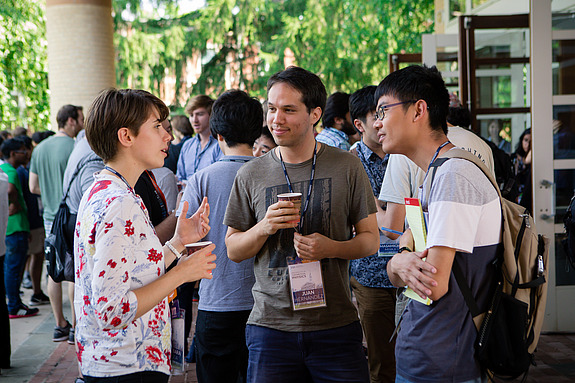Institute’s PiTP Program to Examine “Great Problems in Biology for Physicists”
Press Contact

The worlds of theoretical physics and biology will soon collide during Prospects in Theoretical Physics (PiTP) on the Institute for Advanced Study campus. The IAS program will welcome dozens of acclaimed experts from around the world, including those specializing in DNA structure and sequencing, evolution, machine learning, and immunology. This marks the 18th year of the program, which will be held from July 15–26, 2019. The intensive summer program will empower a new generation of graduate students and postdoctoral scholars to apply their energy and insight to some of the most complex and intriguing questions in the biological sciences.
Unlike PiTP programs of previous years that have centered around more abstract topics in physics, PiTP 2019 is based on the theme “Great Problems in Biology for Physicists,” covering topics ranging from virology, cancer, and immunology to machine learning and neural networks. Recent technologies have generated enormous amounts of hitherto unseen biological/genetic data. The tools of modern physics enable novel approaches in exploring and studying such data. PiTP 2019 aims to exploit this connection while laying a foundation that will help scientists achieve leaps of fundamental understanding of basic biological processes with the potential for broad application.
“We are particularly pleased that we have had generous support for this year’s program from The Paul G. Allen Frontiers Group, and that we will have a strong cohort of accomplished and talented post-docs, several of whom have had experience on interdisciplinary research teams supported by the National Science Foundation and will participate as part of the NSF-sponsored Cancer Convergence Education Network,” stated Arnold J. Levine, Professor Emeritus in the School of Natural Sciences and founding head of the Simons Center for Systems Biology. “We hope that all participants will be able to benefit from opportunities for significant informal discussions and interactions with the lecturers and other participants.”
Scholars from 46 institutions, including Stanford, Yale, the University of California, Imperial College London, MIT, Oxford, Cambridge, the Perimeter Institute for Theoretical Physics, Leiden University, Cold Spring Harbor Laboratory, Columbia, Princeton, and the IAS will take part. Participants come from 22 different countries, including Japan, India, China, Nepal, Italy, Russia, the UK, Spain, Israel, and the Netherlands.
For press interested in covering PiTP, please contact Lee Sandberg at lsandberg@ias.edu. For more information on Institute sponsored events, visit www.ias.edu/events.


